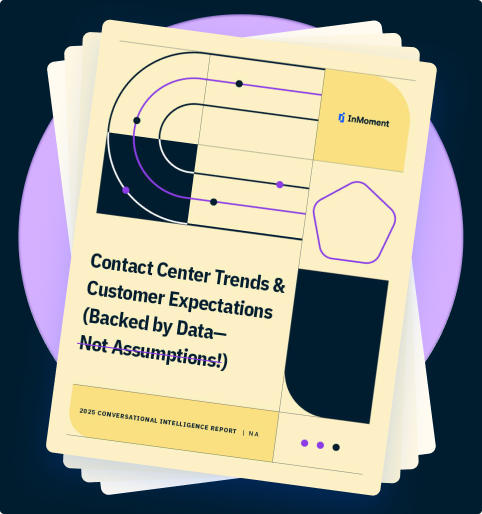Conversation Intelligence Software: How It Works, Who It Benefits, and Key Features
Discover how conversation intelligence software captures, analyzes, and transforms conversations into insights that improve sales, support, and CX.
Understanding your customers means listening to them, but not just passively. Conversation intelligence (CI) software helps enterprise organizations actively capture, analyze, and transform customer conversations across every channel into actionable insights. Whether it’s a support call, a live chat, or a sales meeting, CI software extracts value from every interaction to improve operational efficiency, elevate customer experience (CX), and boost revenue performance.
In this guide, we’ll walk through how conversation intelligence software works, who it benefits, and the top features to look for in an enterprise-ready solution.
What is Conversation Intelligence Software?
Conversation intelligence software is an AI-powered solution that captures and analyzes customer interactions across voice, chat, email, and video. It transforms raw conversations into structured insights using natural language processing (NLP), sentiment analysis, and predictive analytics.
CI software helps companies:
- Understand customer sentiment and intent
- Surface trends and emerging issues
- Improve agent performance
- Drive better business decisions across departments
It’s not just about recording conversations, but turning them into a competitive advantage.
How Does Conversation Intelligence Software Work?
CI software operates behind the scenes to capture, process, and analyze vast amounts of customer interaction data in real time or post-conversation. Here’s how the process works:
Data Collection
CI software starts by capturing interactions from a wide range of sources: phone calls, support chats, emails, social media messages, and video conferencing platforms. This multichannel approach ensures no customer insight gets lost.
Preprocessing
Before analysis, the software cleans and prepares the data. This may include removing background noise, formatting transcripts for consistency, and organizing data by metadata (e.g., date, customer ID, interaction channel).
Audio Transcription
Using speech recognition technology, CI tools transcribe spoken content into text. High-accuracy transcription engines ensure that spoken nuance becomes searchable, enabling deeper analysis.
Natural Language Processing
Advanced natural language processing (NLP) helps interpret the tone, intent, and meaning of interactions. Layered with sentiment and emotion detection, NLP identifies keywords, urgency signals, escalation risks, and product feedback within conversations.
Analytics and Reporting
The final step surfaces insights through dashboards, reports, and alerts. CI platforms generate performance metrics, customer trends, satisfaction indicators, and action items tailored for each business function; from sales to CX to operations.For example, InMoment’s Conversational Intelligence platform not only provides interaction summaries, but also flags account health risks and forecasts trends before they impact business outcomes. Learn how it can forecast sales trends.
Why is Conversation Intelligence Software Important?
Conversation intelligence software is important because it will help your business stay competitive and solve your customers’ problems faster. A majority of companies have already deployed conversation intelligence solutions in their customer experience. Of those companies, 90% have reported faster issue resolution. Moreover, 80% of those companies have reported higher call volume processing utilizing AI solutions.
Conversation intelligence software can increase your organization’s customer satisfaction while also increasing employee productivity. By adopting this technology, companies can stay ahead of the competition, make data-driven decisions, and continuously improve their operations. Conversation intelligence software is a critical tool for success in a world where every interaction counts.
Call Tracking Software vs. Conversation Intelligence Software
While both call-tracking software and conversation intelligence software play vital roles in managing and analyzing customer interactions, they serve different purposes and offer distinct functionalities. Understanding the differences between these two types of software is crucial for businesses looking to optimize their communication strategies.
Call tracking software is designed primarily to track and attribute phone calls to specific marketing campaigns or sources. Its main purpose is to help businesses understand which marketing efforts are driving inbound calls and how effective these campaigns are in generating leads.
Conversation intelligence software goes beyond simply tracking calls. It leverages artificial intelligence and natural language processing to analyze the content of conversations, whether they occur via phone, email, chat, or social media. The goal is to extract qualitative insights such as customer sentiment that can improve customer interactions and overall business performance.
Who Uses Conversation Intelligence Software?
Conversation intelligence software can be utilized by multiple teams in an organization to meet their specific needs. Whether sales teams are looking to boost conversion rates or customer support centers are trying to enhance customer satisfaction, here are examples of teams in your organization that can utilize this technology:
Sales Teams
Sales teams are among the primary beneficiaries of conversation intelligence software. By analyzing sales calls and interactions, these teams can identify the strategies that work best in closing deals, uncover common objections, and refine their sales pitch to resonate more effectively with prospects.
Sales managers can also use this data to monitor performance, coach their teams more effectively, and scale successful practices across the organization. This results in higher conversion rates, shorter sales cycles, and more targeted, successful sales efforts.
Customer Experience or Support Teams
CX and support teams use CI software to improve service outcomes and customer satisfaction. It helps identify friction points, highlight training opportunities, and resolve issues faster. CI tools also enable Voice of the Customer (VoC) programs by capturing unfiltered feedback across channels, making it easier to act on what matters most.
Contact Centers
High-volume contact centers benefit enormously from conversation intelligence. With thousands of calls daily, human review simply isn’t scalable. CI software automates monitoring, detects compliance risks, evaluates agent performance, and uncovers trending customer pain points. The result: lower operational costs, faster resolution times, and improved Net Promoter Score.
Marketing Departments
Marketing teams can use conversation intelligence software to gain deeper insights into customer behavior and preferences. By analyzing customer interactions across various channels, marketers can identify trends, track the effectiveness of campaigns, and understand the language and messaging that resonate most with their audience. This data-driven approach allows for more targeted marketing strategies, improved messaging, and better-aligned content that speaks directly to customer needs.
Operations Teams
Operations teams use CI insights to streamline processes, reduce cost to serve, and remove systemic friction points. For example, if repeated call transcripts show confusion around a particular process or policy, operations can proactively redesign it. CI helps turn qualitative feedback into data-driven improvements.
Digital Teams
Digital teams benefit by using CI insights to refine digital journeys. From identifying pain points in self-service flows to detecting broken website elements based on customer complaints, conversation intelligence bridges the gap between human interaction and digital experience.
Features to Look For In Conversation Intelligence Software
When selecting conversation intelligence software for your business, it’s essential to choose a solution that aligns with your specific needs and objectives. Here are the key features to look for when evaluating conversation intelligence software:
1. Conversation Analytics
Conversational analytics allows businesses to pull insights from conversations with customers. Unlike basic transcription or keyword tracking, conversational analytics goes deeper by analyzing the context, sentiment, and flow of these interactions. This feature is particularly useful in understanding the full scope of a conversation, as it captures not just what was said, but how and why it was said. By threading conversations together, businesses can see the progression of a customer’s issue or inquiry, how it was handled over time, and whether the resolution met the customer’s expectations.
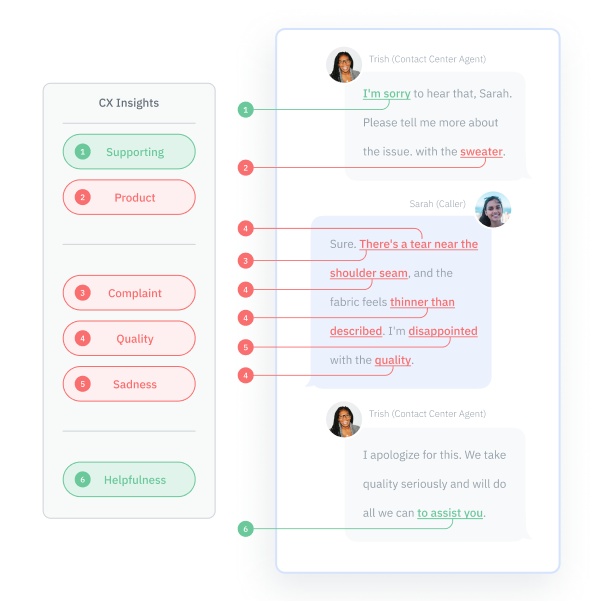
2. Text Analytics
The best conversational intelligence solutions will also include text analysis software. Text analytics is different from conversation analytics because it makes sense of the vast amounts of unstructured data generated by customer interactions. Traditional data analysis methods often fall short when it comes to understanding the nuances of text-based communication, where the meaning can be heavily context-dependent. However, text analytics leverages advanced natural language processing (NLP) and machine learning algorithms to unlock the hidden value within this data.
This feature allows businesses to automatically detect recurring themes, trends, and anomalies in customer feedback, whether it’s through emails, chat messages, social media posts, or other text-based channels. By identifying these patterns, businesses can gain a deeper understanding of customer sentiments, pain points, and emerging needs. Additionally, the ability to spot anomalies—such as a sudden spike in negative feedback or a recurring issue that has gone unnoticed—enables businesses to proactively address potential problems before they escalate.
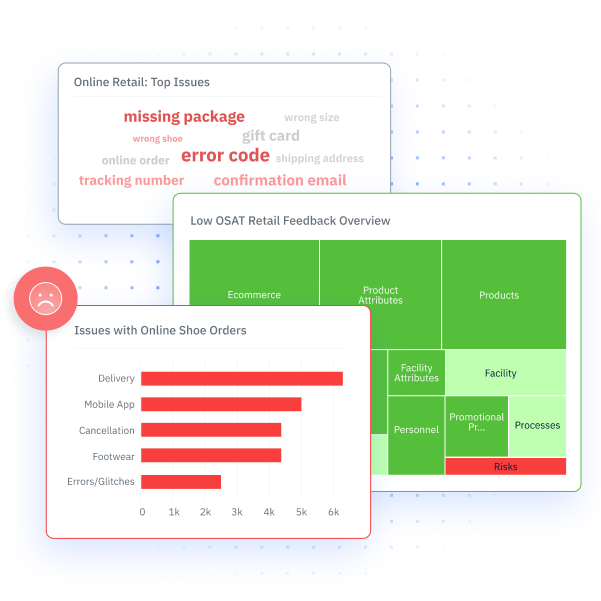
3. Agent & Manager Scorecards
Agent and coach scorecards are invaluable tools for businesses aiming to optimize the performance of their customer-facing teams. These scorecards provide a comprehensive view of individual agent and team performance, offering insights into both strengths and areas that need improvement. By using metrics derived from conversation analytics and AI-driven text analysis, scorecards can objectively evaluate how well agents are handling customer interactions, including their ability to resolve issues, maintain a positive tone, and adhere to company protocols.
For managers and coaches, these scorecards are essential for identifying top performers as well as those who may require additional training or support. The detailed performance data also enables more personalized coaching, where feedback is tailored to the specific needs and challenges of each agent. Over time, this leads to a more engaged, motivated workforce.
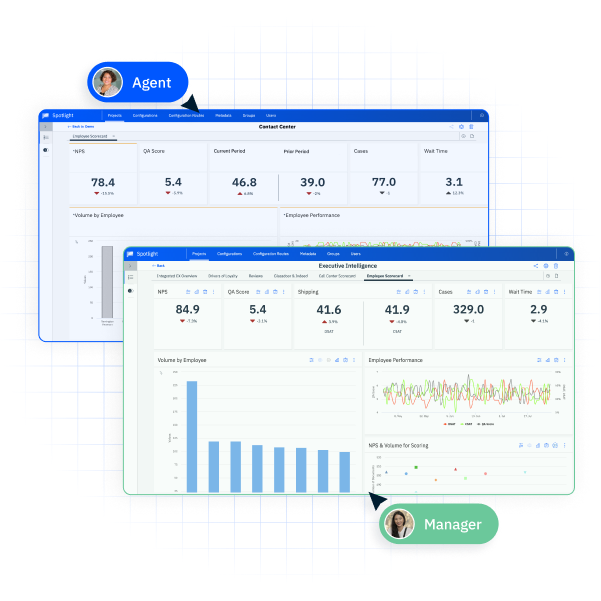
4. Omnichannel Signal Capture
Your software should be able to unify voice, chat, email, and video interactions into a centralized view. True omnichannel signal capture enables deeper analysis and delivers complete visibility into the customer journey, helping teams understand context across every touchpoint.
5. Impact Prediction
Impact prediction is a feature that will allow organizations to see what is affecting their main metrics the most. By analyzing historical data and using predictive analytics, this feature can forecast the potential outcomes of different actions and strategies. For example, it can predict how changes in agent behavior, communication strategies, or customer engagement practices might impact customer satisfaction scores, sales conversion rates, or operational efficiency. This insight is crucial for businesses looking to prioritize their efforts and resources effectively.
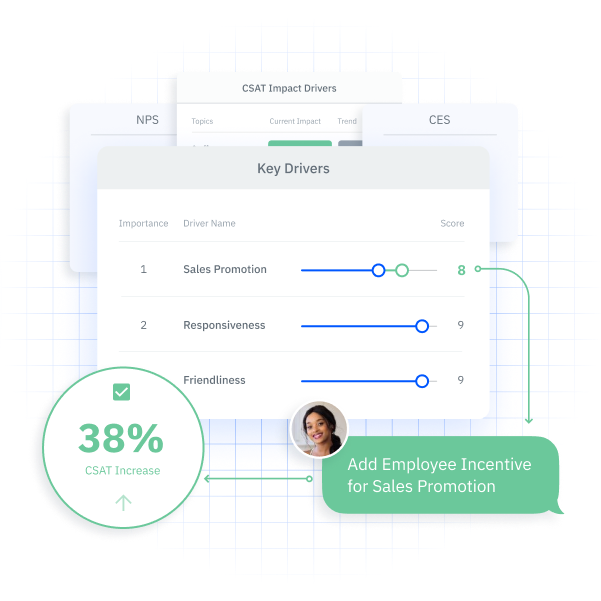
6. AI Summarization
CI software should include AI-powered summarization to condense long conversations into concise action items or key themes. These summaries save time for managers, help prioritize follow-ups, and provide a quick overview for cross-functional teams.
7. Real-Time and Post-Call Transcription
Real-time transcription allows supervisors and QA managers to monitor live calls, while post-call transcripts ensure accurate, searchable records. Both help teams analyze trends, train agents, and act quickly on customer issues.
8. Sentiment and Emotion Detection
The best CI software doesn’t just track keywords, but understands how customers feel. By detecting sentiment and emotion, teams can spot when customers are frustrated, confused, or delighted, and proactively step in before issues escalate.
9. Strategic Services
When evaluating conversation intelligence software, you may choose a solution that comes with with expert guidance and tailored reporting on their most critical business questions and drivers. These services are typically delivered by experienced professionals who specialize in conversation intelligence and data analytics. They work closely with businesses to understand their unique challenges, goals, and operational context, and then provide customized insights and recommendations.
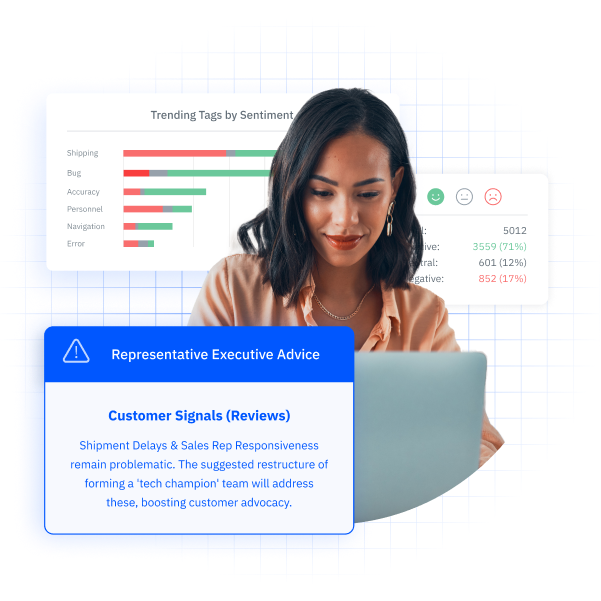
Choosing the right conversation intelligence software is a critical decision that can significantly impact your business’s ability to understand and engage with customers effectively. By prioritizing features like real-time transcription, sentiment analysis, integration capabilities, and AI-powered insights, you can select a solution that not only meets your current needs but also supports your long-term growth and success.
How to Purchase Conversation Intelligence Software
Investing in conversation intelligence software is a strategic decision that can significantly enhance your business’s ability to understand and engage with customers. However, purchasing the right solution requires careful consideration of your unique needs, budget, and long-term goals. Here’s a step-by-step guide to help you navigate the process of selecting and purchasing conversation intelligence software:
1. Assess Your Business Needs
Before diving into the market, take the time to thoroughly assess your business needs. Identify the specific problems you want the software to solve. Consider which teams will use the software and what features are most important to them.
For example, a sales team may prioritize real-time analytics and AI-driven insights, while a compliance team might focus on robust monitoring and reporting capabilities. Clearly defining your needs will help you narrow down your options and choose a solution that aligns with your business objectives.
2. Research Available Solutions
Once you have a clear understanding of your requirements, start researching the available conversation intelligence software solutions on the market. Look for products that offer the features and capabilities that meet your needs. To get a sense of how solutions platforms perform, read reviews, case studies or third-party reports such as Forrester Wave for text analytics.
3. Request Demos and Trials
After narrowing down your options, request demos or free trials of the conversation intelligence software you’re considering. This hands-on experience will allow you to see the software in action, explore its interface, and assess its ease of use.
Pay attention to how intuitive the software is for your team members and whether it integrates seamlessly with your existing systems, such as CRM or call center software. During this trial period, involve the key stakeholders from different departments to gather their feedback and ensure the software meets their specific needs.
4. Evaluate Costs and ROI
Understanding the costs associated with conversation intelligence software is crucial for making an informed purchase decision. Evaluate the pricing models offered by different vendors—some may charge based on the number of users, the volume of conversations analyzed, or specific features included. Be sure to factor in any additional costs for implementation, training, and ongoing support.
While cost is an important consideration, focus on the potential return on investment the software can provide. A higher initial investment may be justified if the software delivers significant improvements in customer satisfaction, sales performance, or operational efficiency. To see the ROI you can get from InMoment’s platform, check out our ROI calculator!
5. Make the Purchase and Plan the Rollout
Choose a partner with onboarding support and built-in scalability. Align your implementation with current workflows, prioritize a pilot launch if needed, and use early insights to drive adoption and demonstrate value across teams.
Conversation Intelligence Software Trends
The CI software market is poised to grow rapidly, with the global market projected to reach $43.2 billion by 2032, growing at a CAGR of 20.6% from 2023 (Allied Market Research, 2023).
Key trends driving growth in 2025 include:
- Generative AI Integration: Platforms are evolving to include generative AI for summarization, automated responses, and more contextual insights.
- Emotion AI Advancements: Improved modeling of customer emotion is helping brands proactively respond to churn signals and escalate issues in real-time.
- Deeper Integration Across CX Tech Stacks: More organizations are embedding CI software into CRMs, ticketing platforms, and survey-based CX tools to create seamless workflows.
- Increased Focus on Agent Enablement: Beyond analysis, CI tools now help coach agents in real time, delivering tips during calls to improve outcomes.
Choose InMoment for Your Conversation Intelligence Software
InMoment’s Conversational Intelligence software is built for enterprise teams that want to go beyond basic call transcripts. It captures, processes, and analyzes every customer interaction, across every channel, to deliver deep insights that drive growth and operational efficiency.
Why InMoment?
- Omnichannel Signal Capture to unify conversations across voice, chat, email, and video
- Real-Time Transcription & Sentiment Analysis for faster, data-backed decisions
- AI-Powered Summaries that save time and surface what matters most
- Performance Scorecards to improve agent training and QA at scale
- Integrated CX Intelligence with survey, review, and experience data in one platform
- Impact Prediction Models that forecast churn, satisfaction, and account health
- Low Complexity Implementation with tools that are easy to launch and use
The future of CX isn’t just listening, but acting. And InMoment helps enterprise teams turn every customer conversation into a strategic advantage.Get a demo to see what InMoment’s Conversational Intelligence can do for you.
References
Geneys. MIT Technology Review Insights: How Global Companies Are Winning at AI Deployment. (https://www.genesys.com/blog/post/mit-technology-review-insights-how-global-companies-are-winning-at-ai-deployment). Accessed 8/8/2024.
PR Newsire. MIT Global Survey: 90% of Companies Deploy Artificial Intelligence in the Customer Journey. (https://www.prnewswire.com/news-releases/mit-global-survey-90-of-companies-deploy-artificial-intelligence-in-the-customer-journey-300749927.html). Accessed 8/8/2024.
Future Market Insights. Conversation Intelligence Software Market. (https://www.futuremarketinsights.com/reports/conversation-intelligence-software-market). Accessed 8/12/2024.

